“What is eminent domain? Can the government really just take my land or property?” Our North Carolina eminent domain lawyers answer some of the most common questions we receive from property owners whose land is being taken by the government.

The short answer is that eminent domain is the power of the sovereign (the government) to take or seize any property in its domain (borders). And yes — local, state, and federal governments can use eminent domain to take land or property from U.S. citizens and North Carolina residents like you, and it’s more common than you might think. This is where a North Carolina Eminent Domain Lawyer can help.
That being said:
You do have certain rights if the government invokes eminent domain to take your land or property.
How can the government use eminent domain to take my land or property?
Eminent domain is ultimately allowed and controlled by the 5th Amendment to the US Constitution, which states:
“No person shall be…deprived of life, liberty, or property without due process of law; nor shall private property be taken for public use without just compensation.”
The federal government has also allowed state and local governments to maintain the power of eminent domain within their own borders.
In North Carolina, the power of eminent domain is allowed under Article I, Sections 19 and 25 of the North Carolina Constitution. Additionally, North Carolina has codified the methods for the State, some municipalities, and even some utility companies to exercise the power of eminent domain in Chapter 136 and 40-A of the North Carolina General Statutes.
For ease of conversation, we’ll refer to all parties with power of eminent domain as the “government” in this blog post.
Is the government taking your land? You deserve fair value for your property. Please call 1-800-525-7111 today for a FREE consultation with a North Carolina eminent domain lawyer.
There is no upfront cost and there are no attorney fees unless we get you more compensation from the government.
Please call 1-800-525-7111 today for a free, no-obligation consultation with a North Carolina eminent domain lawyer.
Eminent domain in North Carolina: can I stop the government from taking my land or property?
Before even considering a North Carolina eminent domain lawyer, most people facing land or property seizure ask themselves a simple question:
“What can I do about it?”
In rare circumstances, you may actually be able to stop the government from taking your property. For instance, you may have a protected species on your property or in your area that the government missed in its environmental study. In this case, the government may halt the project to protect the species. Or perhaps the government failed to follow their own policies when studying the area being taken for public use. However, these circumstances are not common, and even they may not be enough to stop the government from taking your land or property with eminent domain.
In another scenario, you may be able to prove that the government’s taking of your property is not for a public use. You may also find some other reason to challenge the taking itself. However, don’t count on it. These occasions are also very rare and highly unusual.
Generally speaking, there's not much property owners can do to stop the government from taking property with the power of eminent domain. Most of the time, the landowner’s main method of recovery is to make sure that they are fairly compensated for what is taken from them. The vast majority of eminent domain cases in North Carolina therefore focus on what the land or property is actually worth, and not whether or not the government can be stopped.
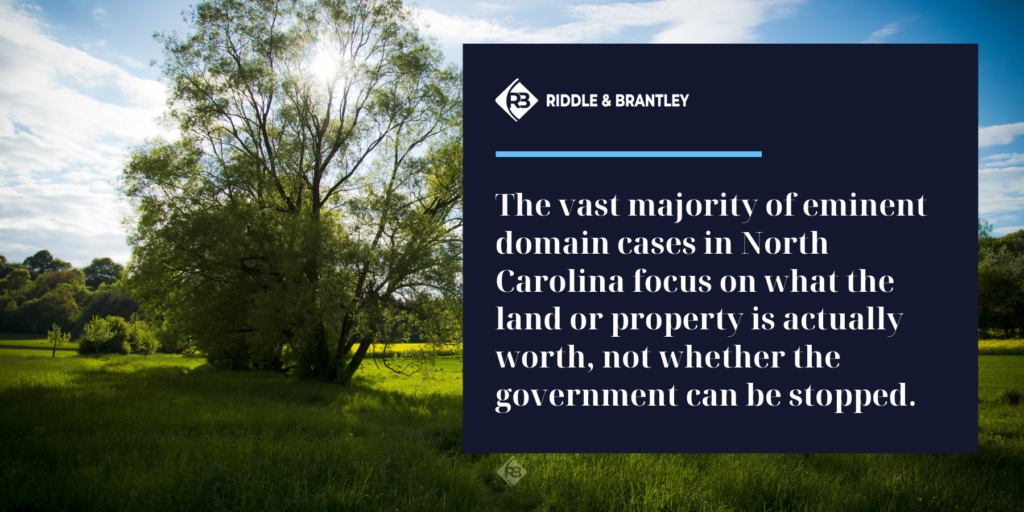
Is the government taking your land under eminent domain? Call 1-800-525-7111 for a FREE, no-obligation consultation with a North Carolina eminent domain attorney today.
When can the government use eminent domain?
The power of eminent domain is most commonly used when the government takes someone’s property to build a highway or road of some type, possibly accompanied by some easements. Such use of eminent domain easily satisfies the public use requirement, because the taking of the property is for the easy, safe, and convenient transportation of the public. By abiding by the laws in the statutes above, the government satisfies the due process element of eminent domain.
Scenarios in which the government may exercise eminent domain include, but are not limited to:
- Building a highway or road
- Building a school
- Creating a greenway or green space
- Building a public park
- Putting down water lines
- Putting down natural gas lines
- Installing electric lines, poles, and access areas to reach them
- Putting down communication cables such as telephone cables or fiber-optic lines
- Building a hospital
- Constructing a public administration building such as a Town Hall or a Department of Transportation building
If the government decides to use eminent domain to take your land or property, chances are it cannot be stopped. So, we’ll turn to the next biggest question:
What is the fair value of your land or property?
In eminent domain law, this principle is called “just compensation.”
What is just compensation?
The government MUST pay just compensation to take someone’s property with the power of eminent domain. It is a safeguard written into the Constitution by the founding fathers. The principle of just compensation ensures that the needs of the country are met through eminent domain, while at the same time guaranteeing that the individual will not alone bear the brunt of public use without being fairly compensated for the loss of land or property.
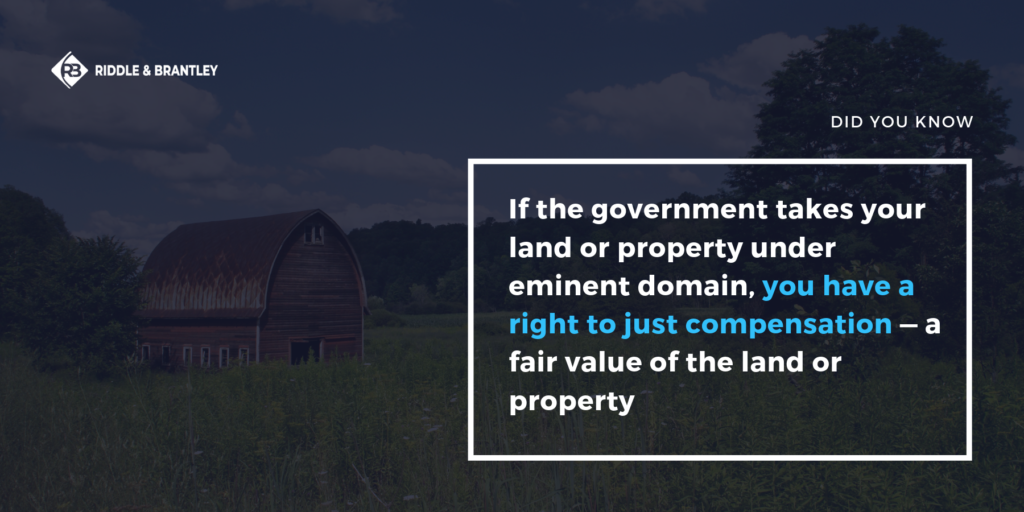
In most eminent domain cases, just compensation is highly debatable and often the subject of extensive legal challenge. This is because in many cases, the government initially offers less money for the taken property than it is actually worth.
That’s the bad news.
The good news is that property owners — often with the assistance of an experienced eminent domain lawyer — can challenge the government and win appropriate compensation.
The million-dollar question (and sometimes it really is) then becomes:
“How do I know if the government is paying me just compensation for my property?”
When the government takes your land or property with eminent domain, you deserve to be paid what is actually fair. The government doesn’t get a discount just because it is the government. If you take one thing away from this blog post, let it be this:
You do not have to accept what the government offers, and it is often the case that you shouldn’t.
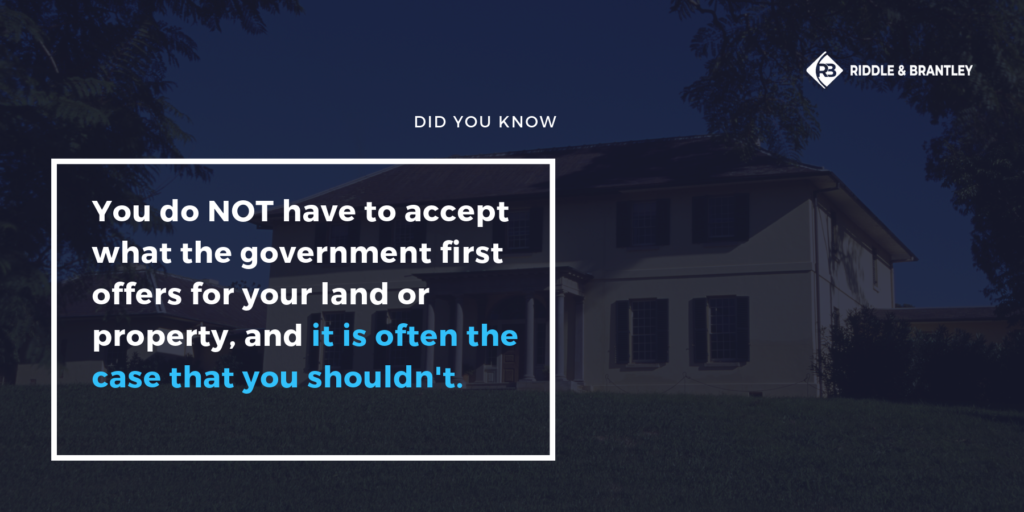
In North Carolina, the difference in the market value of the property before the taking (“the before condition”) and the market value of the property after the taking (“the after condition”), is what has been determined to be just compensation for the purposes of eminent domain.
Is the government taking your property? You deserve an eminent domain attorney who will fight for your right to just compensation. Call 1-800-525-7111 to speak with a North Carolina eminent domain lawyer today.
There is no obligation and we only get paid if we get you additional money from the government for your taken property.
Please call 1-800-525-7111 today and let's review your eminent domain case.
How does the appraisal process work in eminent domain cases?
Market value of a property is what a willing buyer will pay and what a willing seller will accept for a property. Both the government and property owners often use appraisers to determine these types of values. However, value assessments between appraisers can vary. Sometimes, the assessments of different appraisers vary to degrees that are unexpected. In many cases, appraisers view the methods used to determine property value in different ways depending on the particular facts, characteristics, and conditions of the property.
The list is seemingly endless.
Different aspects of your property allow appraisers to adjust the value of comparable sales up or down when comparing them to your property, often allowing them to increase or decrease the value of your property as they see fit. Therefore, the appraiser plays a very important role in how much you are compensated for your property when it is taken by the government under eminent domain.
When engaging in a project where they take property, the government contracts with appraisers to perform appraisals or value findings on many properties along the project. They work with many of the State’s engineer’s, attorneys, and negotiators on a regular basis. These appraisers benefit greatly from keeping steady work for the State, usually from the Department of Transportation. Before accepting any offer made by the government, whether or not it is based on an appraisal, you should consult your North Carolina eminent domain attorney. Often, you will find that having an attorney who is familiar with experts such as appraisers, developers, land planners, and real estate brokers, can help you increase your just compensation.
Does the government consider the “emotional” value of property taken?
Sometimes the government uses eminent domain to take property that has been in a family for generations. In these cases, the impact on the property owner(s) can be especially devastating.
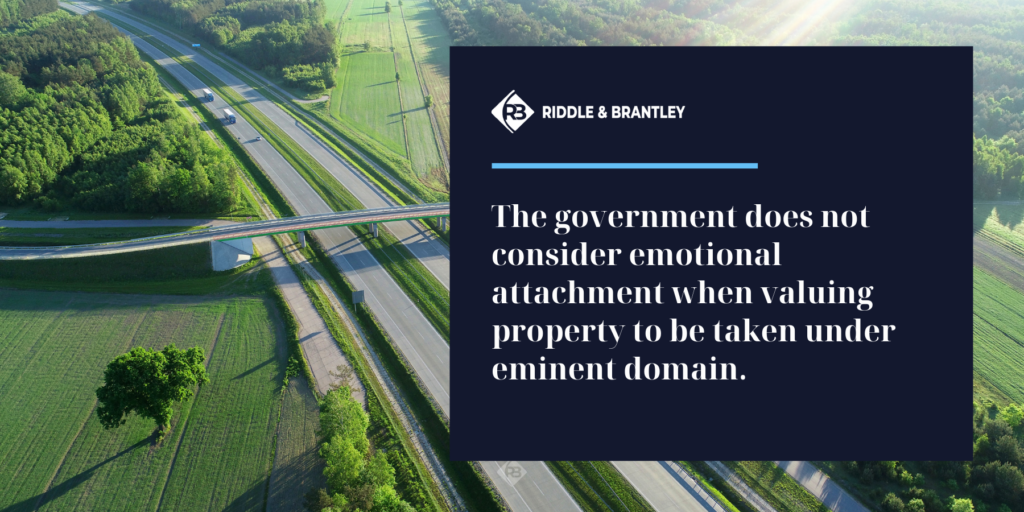
Unfortunately, the government does not consider the emotional attachment that the property owner has to the land but instead forces the case to be heard under the fiction that the property owner is a willing seller. However, an owner’s opinion of valuation of the property is admitted into evidence in court just as an appraiser’s opinion would be. Unless proven otherwise, an owner is presumed to be familiar enough with the value of her property and property in the surrounding area to be able to give a competent value. This doesn’t mean a jury will necessarily agree with you but you will get the opportunity to be heard.
Do I need an eminent domain lawyer? Can’t I just represent myself?
Lots of folks ask us, "Do I really need an eminent domain lawyer?"
Here's the deal:
You can definitely represent yourself. But why would you want to? Eminent domain cases in North Carolina can be extremely complex and time-consuming. If you have an eminent domain attorney who works regularly on eminent domain cases with appraisers, engineers, water flow experts, surveyors, developers, and land planners, why wouldn't you let that attorney work this case for you?
Preparing and trying an eminent domain case can and should be approached as a full time commitment.
What information will a lawyer need from me?
- Address
- Project name or number affecting your property
- A short conversation or time for a site visit to see property first hand.
How long does a typical eminent domain case take?
It depends on several factors. Many eminent domain cases are settled without the government having to file any documents with the court. These may be wrapped up in just a few weeks or months after the governments initial offer. A case that is more complex or that the government is stubborn on getting to the real amount of just compensation may take much longer than a year.
What does an attorney cost?
A good eminent domain attorney should add value to your case. A contingency fee is the type of fee that pays an attorney based on the value that they add to your case. An hourly fee pays an attorney for the amount of time they spend on your case whether or not that time adds value. At Riddle & Brantley, we only charge a contingency fee on what we collect for you above and beyond the government’s initial offer.
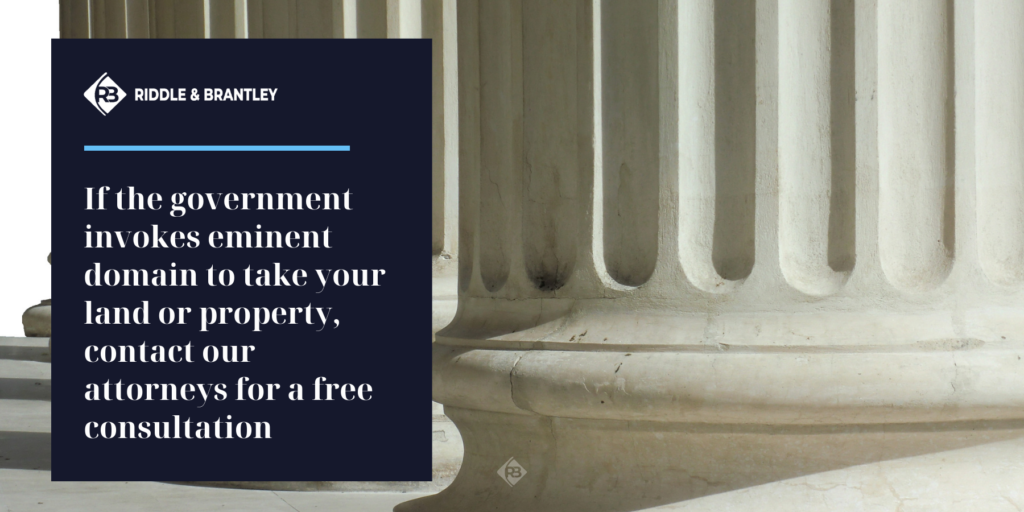
Need a North Carolina eminent domain attorney?
The North Carolina eminent domain lawyers at Riddle & Brantley are experienced at getting you fair compensation when the government takes your land or property. You deserve justice.
For a free consultation, please fill out the form below or call us at 1-800-525-7111.
Eminent domain projects we are currently working on include but are not limited to:
- Asheville I-26 Connector
- Sweeten Creek Rd. Widening in Asheville
- I-26 Widening between Asheville and Hendersonville
- US-70 Improvements in James City
There are no attorney fees unless we win your case. We only get paid if we obtain additional compensation from the government for your property.
Call 1-800-525-7111 today and let's review your case.